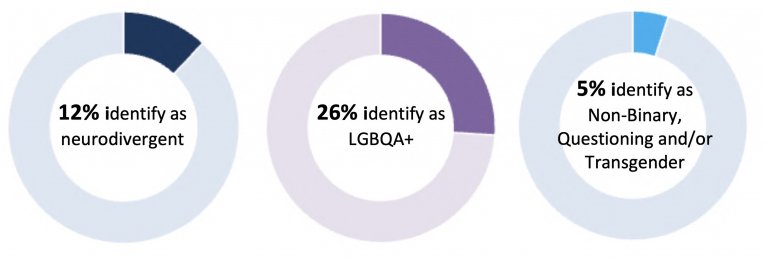
Clare Reddington CEO
on Wed 19 Oct 2022Watershed's Balance and Belonging Data 2022
Posted on Wed 19 Oct 2022
For the second year running we are publishing Balance and Belonging, a report which shares Watershed's Staff, Board & Freelancers Diversity & Inclusion Data for the last year.
In 2020, we published a set of commitments in response to Black Lives Matter - one of these was to openly publish data on the demographics of who works for and with us, with a commitment to improving our intersectional diversity. We first published this data in 2021.
Our Data Inclusion Group developed an approach using Culture Amp's Balance and Belonging framework that moved us from measuring ourselves against demographic benchmarks to understanding the intersectional identities of the people who works with us (Balance), and how they experience working with us (Belonging). This sits alongside our work on changing our recruitment process to make it more inclusive.
Who works at Watershed?

This year we have seen a small increase in people who work for Watershed from under-represented groups in terms of age, ethnicity, disability, neurodivergence, sexuality, gender and socio-economic background. Religion has remained largely the same and caregiving status has become more imbalanced.

Whilst Watershed has a more balanced staff team than is average for an organisation funded by Arts Council England in 2020/2021, there is still significant imbalance in many areas, and there are still groups that remain under-represented. With this in mind, we acknowledge there is still a long way to go to achieve the level of balance to ensure our teams are truly diverse, and we will continue to follow our inclusive recruitment strategies.
What is working at Watershed like?
The belonging part of our staff experience survey seeks to understand how our staff team experiences the organisational culture and how the employee experience differs between people with different singular or intersectional identities. We don't share the data for individual departments or identities externally, but use it as a tool to inform our organisational inclusion strategy and work with teams to develop action plans for the areas where we need to improve.
Our survey data shows our key areas of strength (highest favourable scores upwards of 81%) centre around employees feeling they can be their authentic selves at work, and are comfortable sharing their personal background and experiences. Our other high scoring areas include employees feeling that Watershed values diversity, understanding how their work relates to Watershed's mission, and feeling the work we do at Watershed is important.
The data also shows a decrease (in comparison to the 2021 survey) in favourable responses across a number of areas including decision making and equity around shared tasks; whilst this may not be wholly surprising given the responses (the survey took place in March 2022) are within the context of the continuing and significant challenges of the Pandemic, these decreases are also not exclusively a result in a rise of negative responses (in some areas the biggest increase is in neutral responses). Despite this context, it still indicates work needs to be done to address these areas in order for Watershed to continue with its aim to develop an organisational culture which results in all employees being able to respond positively to questions in all these areas.
We are committed to, and rely on, being open to feedback and discussion to constantly develop our thinking, and to ensure our approach and the language we use is as relevant, and as inclusive as possible and we really welcome any feedback you may have after reading this report. We would love to hear from you, so either drop the Inclusion Data group an email or you can email me, thank you.

